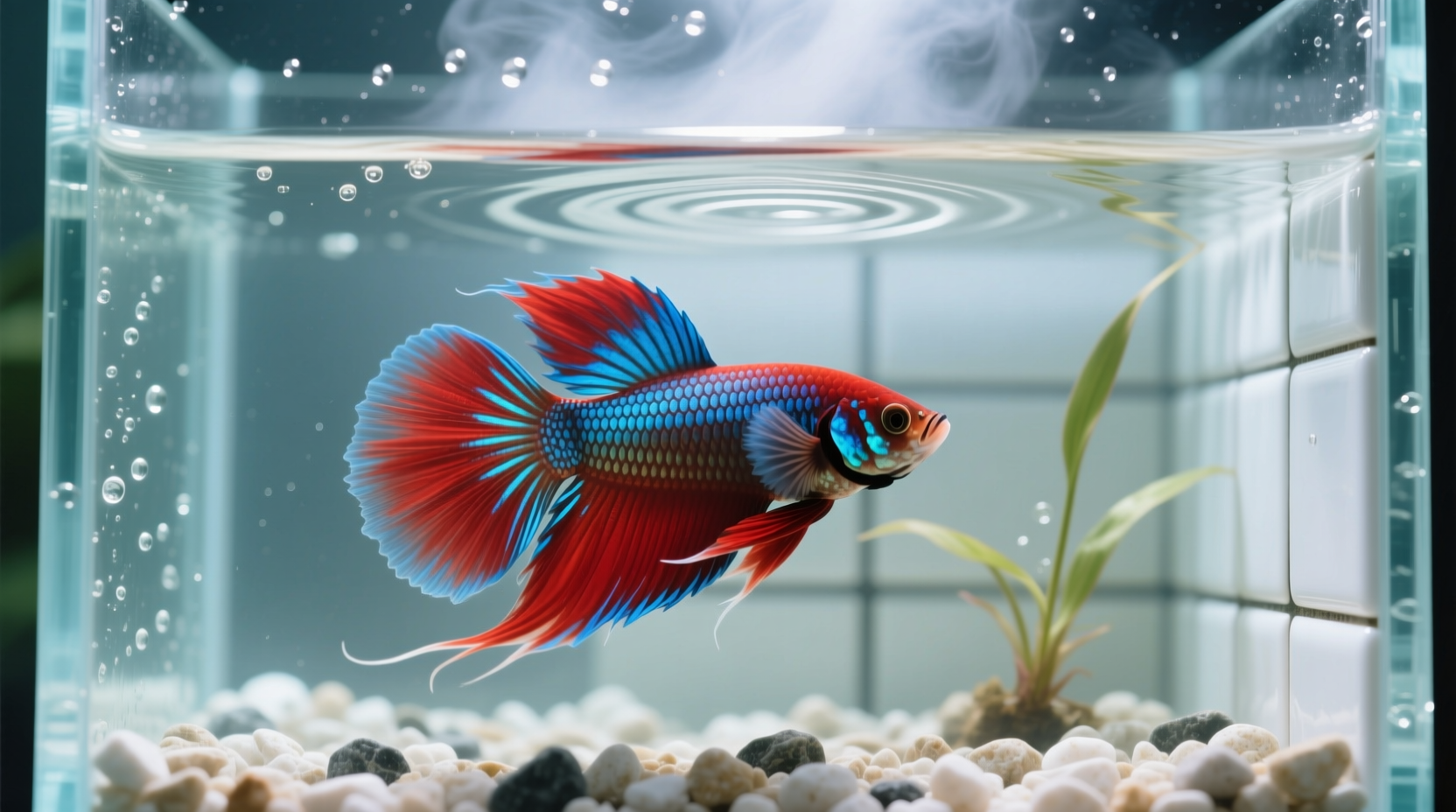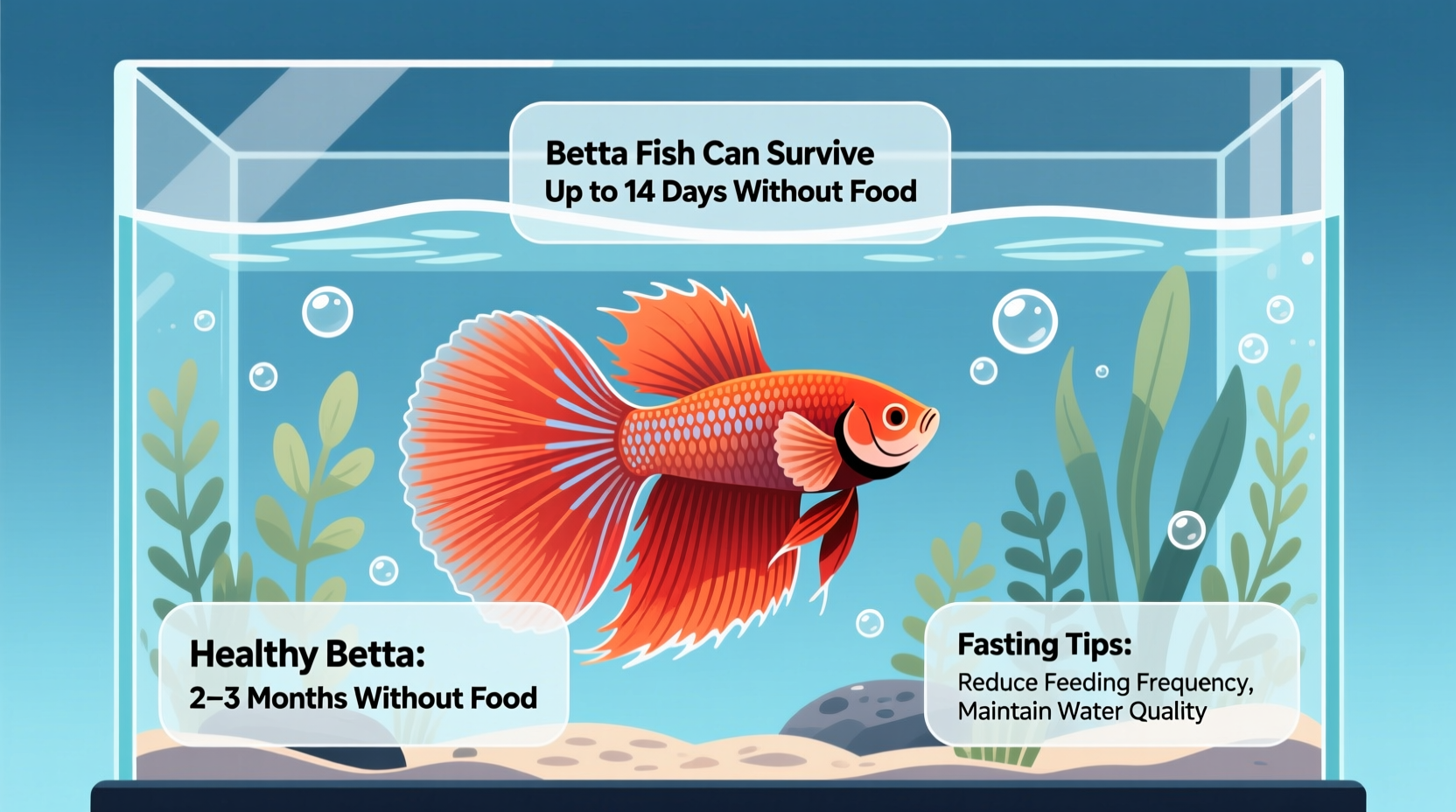Understanding Betta Fish Survival Without Food
When you're planning a trip or unexpectedly can't feed your betta, knowing exactly how long your fish can safely go without food becomes critical. While the standard answer is 10-14 days for a healthy adult betta, several factors dramatically impact this timeline. Let's examine what science tells us about betta metabolism and survival.
Why Bettas Can Survive Longer Than You Might Expect
Bettas (Betta splendens) evolved in Southeast Asia's shallow rice paddies and slow-moving streams where food availability fluctuates dramatically with seasons. This natural adaptation gives them a slower metabolism compared to many other tropical fish species. Their ability to breathe atmospheric air through their labyrinth organ (a special respiratory structure) also reduces stress during periods of low food availability.
According to research published in the Journal of Fish Biology, bettas can enter a temporary state of metabolic conservation when food is scarce, slowing their energy expenditure by up to 30% compared to their normal rate.
Key Factors That Determine Survival Time
Not all bettas will survive the same amount of time without food. These variables significantly impact how long your fish can safely go unfed:
| Factor | Shortens Survival Time | Extends Survival Time |
|---|---|---|
| Water Temperature | 80°F+ (higher metabolism) | 72-76°F (optimal range) |
| Fish Age | Very young or elderly fish | Adult (6-18 months) |
| Tank Conditions | Poor water quality | Stable, clean water |
| Previous Feeding | Consistently underfed | Well-nourished before fasting |
The 14-Day Danger Threshold: What Happens to Your Betta
Understanding the biological timeline of starvation helps explain why exceeding 14 days becomes dangerous. Here's what occurs as days pass without food:
- Days 1-3: Betta uses recently consumed food reserves; no visible impact
- Days 4-7: Begins using fat stores; may show reduced activity
- Days 8-10: Starts breaking down muscle tissue; color may fade
- Days 11-14: Significant muscle loss; immune system weakens
- Day 15+: Organ failure risk increases dramatically
Dr. Jessie Sanders, certified aquatic veterinarian and founder of Aquatic Veterinary Services, explains: "Bettas that go beyond two weeks without food often develop secondary infections due to weakened immunity, even if they initially seem fine. The real danger isn't just starvation—it's the cascading health effects that follow. "
Practical Solutions for Responsible Betta Care During Absences
Rather than testing your betta's survival limits, implement these proven feeding solutions:
Vacation Food Blocks: Proceed With Caution
While convenient, many aquarium professionals warn that vacation blocks can cloud water and promote bacterial growth if not sized correctly. If using one, choose a small, slow-dissolving block and monitor water quality closely upon your return.
Automatic Feeders: The Most Reliable Option
Modern automatic feeders with programmable schedules deliver precise portions. Look for models with moisture protection and multiple feeding slots. Test your feeder with a few days' worth of food before leaving to ensure proper operation.
Trusted Caretaker: The Gold Standard
For absences longer than 5 days, a knowledgeable friend or professional pet sitter remains the best option. Provide clear instructions: "Feed one 3/4 pellet twice daily"—overfeeding causes more deaths than underfeeding.

When the 14-Day Rule Doesn't Apply: Critical Exceptions
While 10-14 days represents the general survival window, certain conditions significantly reduce this timeframe:
- Young bettas (under 6 months): Can only survive 4-7 days due to higher metabolic needs
- Bettas in warmer water (82°F+): Metabolism increases 20-30%, reducing survival time to 7-10 days
- Already underweight fish: May show distress after just 3-5 days without food
- Sick or stressed bettas: Immune-compromised fish deteriorate much faster
The American Society of Ichthyologists and Herpetologists notes that in their field studies of wild betta populations, fish in optimal conditions with stable temperatures survived longer during food scarcity than those in fluctuating environments—a principle that applies to aquarium settings as well.
What to Do When You Return After an Extended Absence
If your betta has gone without food for 7+ days, don't immediately offer a full meal. Follow this refeeding protocol:
- Test water parameters and perform a 25% water change
- Offer half the normal food amount on day one
- Gradually increase to normal portions over 3 days
- Monitor for 48 hours before resuming regular feeding schedule
Overfeeding after a fast can cause fatal digestive issues. If your betta shows no interest in food after 24 hours of your return, consult an aquatic veterinarian immediately.
Preventing Emergency Situations: Smart Betta Care Planning
Responsible ownership means planning for absences before they happen:
- Maintain a 30-day supply of high-quality betta pellets
- Keep automatic feeder programmed with your regular schedule
- Establish relationships with multiple potential caretakers
- Use vacation feeders only for absences of 3-5 days
- Never rely on plant matter or tank algae as primary food source
Remember that while bettas can survive short periods without food, intentional fasting harms their long-term health. The 10-14 day window represents an emergency maximum, not a recommended practice.











 浙公网安备
33010002000092号
浙公网安备
33010002000092号 浙B2-20120091-4
浙B2-20120091-4